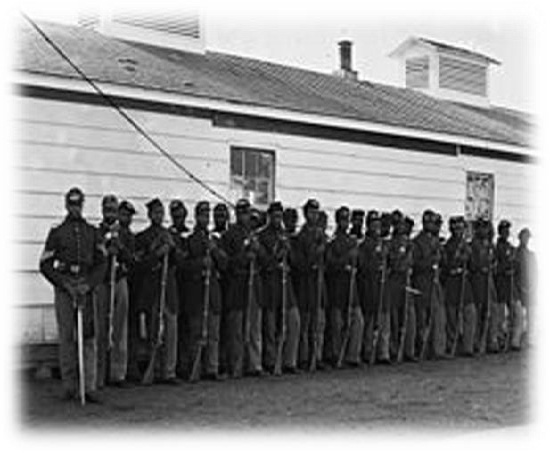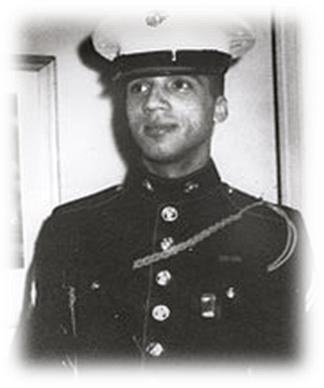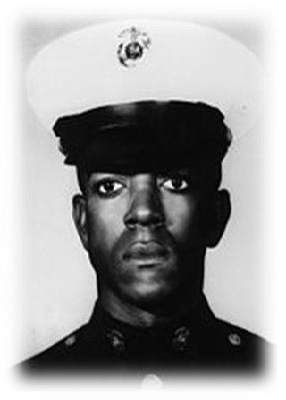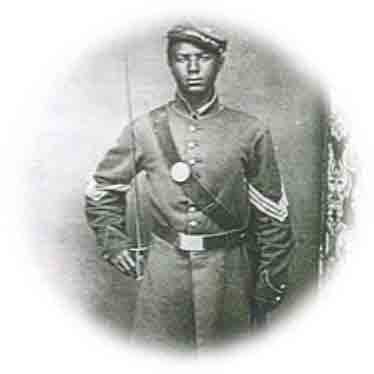
Caption for Colored Troops Company E, 4th US Colored Troops at Fort Lincoln, November 17, 1865 (from Library of Congress)
Many Middle Georgians know the heroic story of Marine Sgt. Rodney Davis. He was posthumously awarded the Medal of Honor, America’s highest award in March 1969. Sgt. Davis, after days of battle, according to John Hollis’ book, “Sgt. Rodney M. Davis, The Making of a Hero,” jumped on a grenade and saved the lives of other Marines in his platoon. The 51st anniversary of Sgt. Davis’ sacrifice will be September 6.

Sgt. Rodney M. Davis
Davis wasn’t the first Marine to give his life in such a manner for his comrades. Pvt. First Class James Anderson Jr. also died covering an enemy grenade to protect fellow Marines during a firefight in Vietnam on February 28, 1967. Anderson became the first African-American Marine to receive the Medal of Honor during that conflict when he was posthumously awarded the Medal of Honor on August 21, 1968.

Pvt. First Class James Anderson Jr.
Anderson was from Los Angeles, California. He left college to be a Marine in 1966. Aside from their acts of bravery and sacrifice, there were several other similarities between Anderson and Davis. Anderson would die in a province just north of where Davis would give his life a short seven months later. Sgt. Davis has a guided missile frigate, the U.S.S. Rodney M. Davis, named for him, and James Anderson Jr. Memorial Park in Carson and Anderson Avenue in Compton, both in California, are named for Pvt. Anderson. During the Vietnam War 21 African Americans received the Medal of Honor, 15 posthumously.
African Americans Have Always Served
African Americans have served this country with dignity and honor since the revolution. Twenty-five African Americans received the Medal of Honor during the Civil War, although most were long dead by the time they received the honor. One, Andrew Jackson Smith, a runaway slave, who fought in the Battle of Shiloh in Tennessee and earned his Medal of Honor in the Battle of Honey Hill in South Carolina, didn’t receive his medal until January 16, 2001, 137 years after the battle and 85 years after he was nominated. Smith would die in 1931 at the age of 88.

Battle of Chaffin’s Farm
Thirteen of the 21 Medals of Honor awarded to African Americans during the Civil War came from one fierce conflict, the Battle of Chaffin’s Farm in Virginia on September 29-30, 1864, part of the Siege of Petersburg. In all 23 medals of Honor were awarded for that battle that left more than 5,300 soldiers, from both sides, either dead or wounded.
United States Colored Troops
Regiments of the United States Colored Troops, fought with honor during the Battle of Chaffin’s Farm and the other battles during the siege and throughout the last two years of the war when they were finally allowed to serve. United States Colored Troops comprised about 175 regiments with more than 178,000 free blacks and freedmen. Almost 94,000 came from southern states. By the end of the Civil War, the United States Colored Troops made up nearly one-tenth of all Union troops and 2,751 had died in combat. All totaled, there were 68,178 losses from all causes during the war with disease being the major factor in fatalities for troops, both black and white.
Written by Charles E. Richardson
